Choosing the right e-commerce platform can feel overwhelming, especially with so many options available today. If you’re a business owner looking to take your store online, two popular names you’ll often come across are Dukaan and Shopify.
Both platforms offer great tools, but they cater to slightly different needs.
In this article, we’ll break down the key features, pricing, and benefits of each to help you figure out which one fits your business best — whether you’re just starting or ready to scale.
Let’s get started!
Dukaan vs. Shopify 2025: Quick Comparision
Here is a quick comparison between Dukaan and Shopify.
| Features | Dukaan | Shopify |
|---|---|---|
| Pricing | Starts at $19/month | Starts at £25/month |
| Transaction fees | No transaction fees | Varies on the method of payment |
| Design and customization | ✅ | ✅ |
| Payment gateways | Razorpay and PayU+ Dukaan Pay | 100 payment gateways+ Shopify Pay |
| Inventory management | ✅ | ✅ |
| Marketing and SEO tools | Limited Tools | A variety of Tools are available |
| Customer support | email and chat | 24/7 customer support through various channels |
| Mobile app functionality | Extensive features | Limited Features |
| Scalability | Limited options | Known for scalability |
| Security and Payment Processing | ✅ | ✅ |
| Multi-channel selling | WhatsApp integration | Integrated with Instagram, TikTok, etc. |
| Dropshipping | ❌ | ✅ |
| Point Of Sale | ❌ | ✅ |
| Additional Integration with Apps | ❌ | ✅ |
Dukaan vs Shopify: Detailed Overview
Before we get into the detailed comparison of Dukaan with Shopify, let’s take a look at the overview of both platforms.
Dukaan Overview
Dukaan is a relatively new player in the e-commerce space, focusing primarily on a mobile-first approach.
Founded in 2020, this Indian-based platform has quickly gained traction among small businesses and entrepreneurs looking for a simple, user-friendly solution to set up their online stores.
Besides, Dukaan’s main focus revolves around simplicity and ease of use, making it an attractive option for those new to e-commerce or those with limited technical expertise.
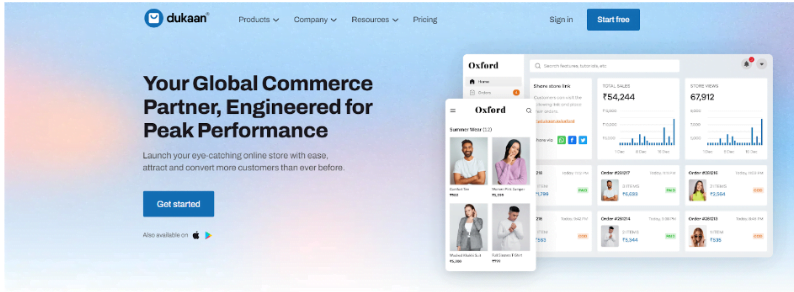
Shopify Overview
Shopify, on the other hand, is a well-established global e-commerce platform that has been around since 2006.
It offers a comprehensive suite of tools and features designed to cater to businesses of all sizes, from small startups to large enterprises.
Shopify’s strength lies in its versatility, scalability, and extensive ecosystem of apps and integrations, making it a go-to choice for businesses looking for a robust and feature-rich e-commerce solution.

Key Features: Dukaan Vs Shopify
Now that you are familiar with Dukaan and Shopify let’s compare their key features to evaluate the best platform for your needs.
1. Ease Of Use And Setup
Dukaan:
Dukaan prides itself on its simplicity and intuitive interface. Setting up a store on Dukaan can be done in a matter of minutes, with a straightforward process that guides users through each step.
The platform’s mobile-first approach means that store owners can manage their entire business from their smartphones, which is particularly beneficial for on-the-go entrepreneurs.
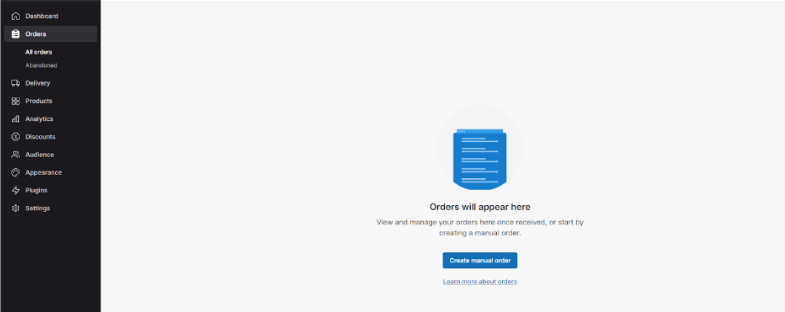
Shopify:
Shopify, while also user-friendly, has a slightly steeper learning curve due to its more extensive feature set. However, it offers a clean and intuitive dashboard that allows users to easily navigate various aspects of their store.
Shopify also provides a setup wizard that guides new users through the process of creating their online store.
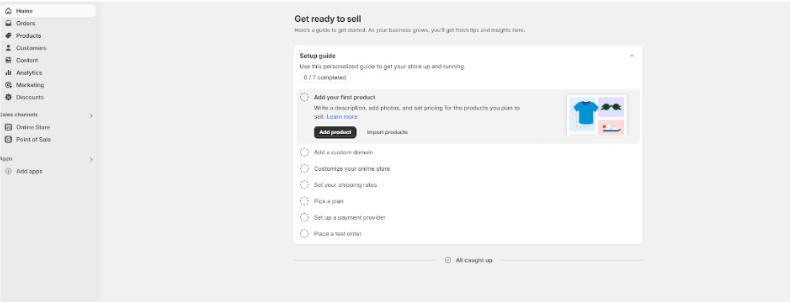
Verdict: Dukaan is more suitable for new sellers, while Shopify is more suitable for users who already have some technical knowledge about the e-commerce platforms.
2. Design And Customization Options
Dukaan:
Dukaan offers a selection of pre-built templates that users can customize to match their brand identity. While the customization options are somewhat limited compared to Shopify, they are sufficient for most small businesses looking for a professional-looking store without investing too much time in design.
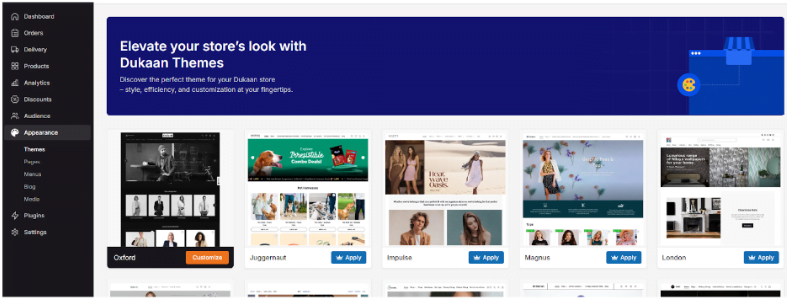
Shopify:
Shopify is popular for customization and excels in this area, offering a wide range of both free and premium Shopify themes. These themes are highly customizable, allowing users to create unique and visually appealing stores.
Shopify also provides a drag-and-drop editor for those who want more control over their store’s design without diving into code.
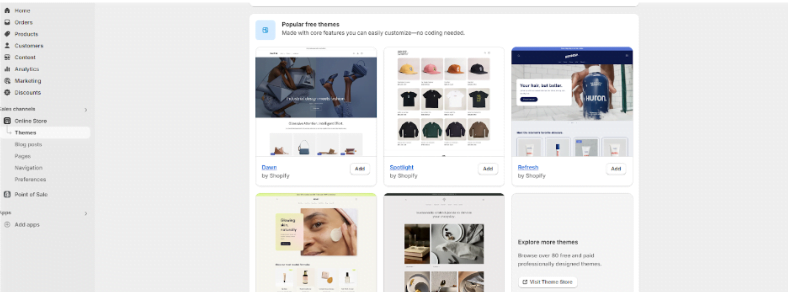
Verdict: The design and customization options are limited in Dukaan, while users can explore large options with Shopify’s premium theme.
3. Payment Gateways And Transaction Fees
Dukaan:
Dukaan integrates with popular payment gateways in India, such as Razorpay and PayU. It also offers its own payment solution, Dukaan Pay. One of Dukaan’s significant advantages is its zero transaction fee policy, which can result in substantial savings for businesses as they grow.
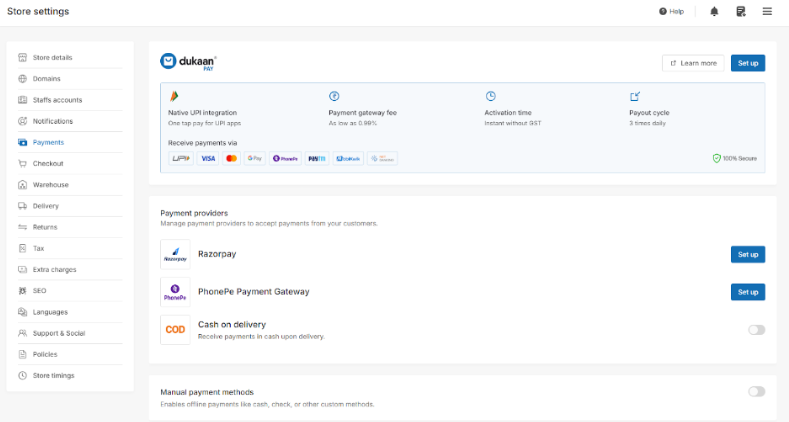
Shopify:
Shopify supports over 100 payment gateways globally, including its own Shopify Payments. Shopify charges transaction fees if you use external payment gateways.
On the other hand, these fees are waived if you use Shopify Payments. The platform’s extensive payment options make it suitable for businesses operating in various countries.
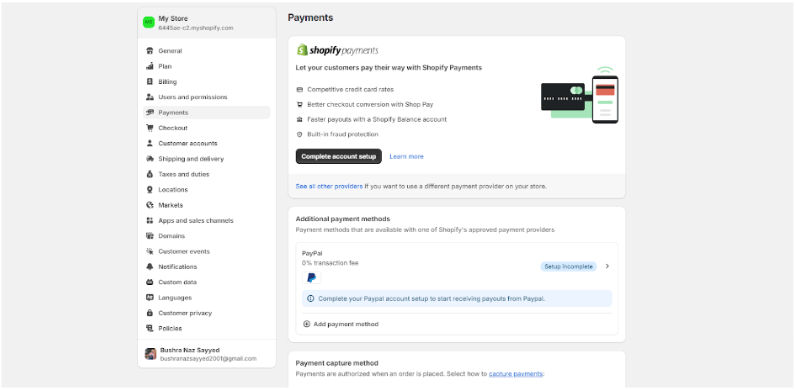
Verdict: Dukaan offers flexibility by cutting off transaction fees, while Shopify offers a more significant number of options to make payments.
4. Inventory Management
Dukaan:
Dukaan provides basic inventory management features that are adequate for small businesses. Users can easily add products, manage stock levels, and track orders through the mobile app or web interface.
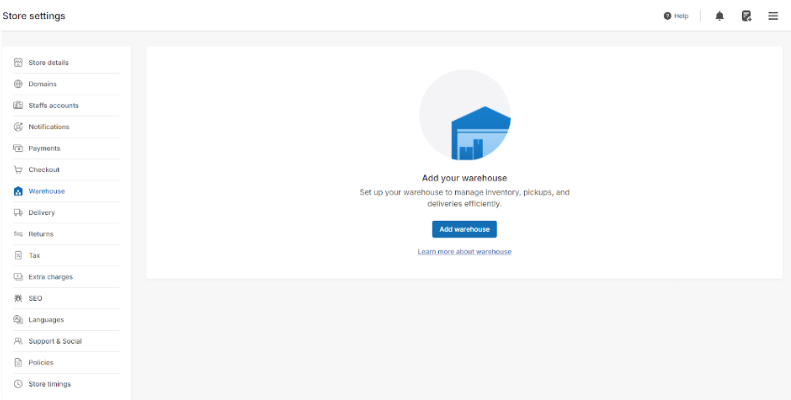
Shopify:
Shopify offers more advanced inventory management tools, including multi-location inventory tracking, automated stock alerts, and inventory forecasting. These features make Shopify a better choice for businesses with complex inventory needs or those operating across multiple locations.
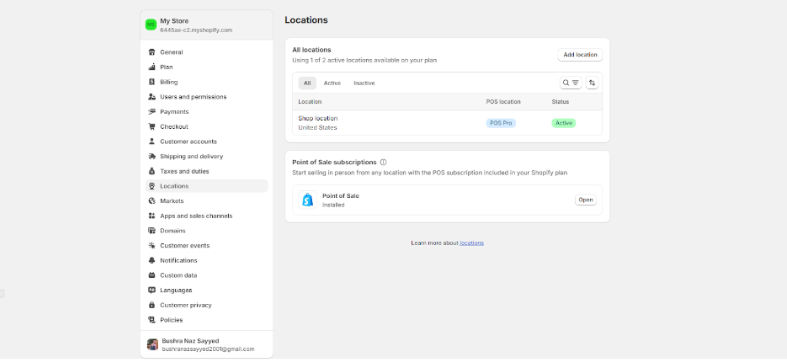
Verdict: Dukaan is a great option for beginners. However, if you have a mid-sized business, Shopify would be a better option.
5. Marketing And SEO Tools
Dukaan:
Dukaan includes basic SEO features and integrates with popular marketing tools like Facebook Pixel and Google Analytics. It also offers built-in social media sharing options to help businesses promote their products.
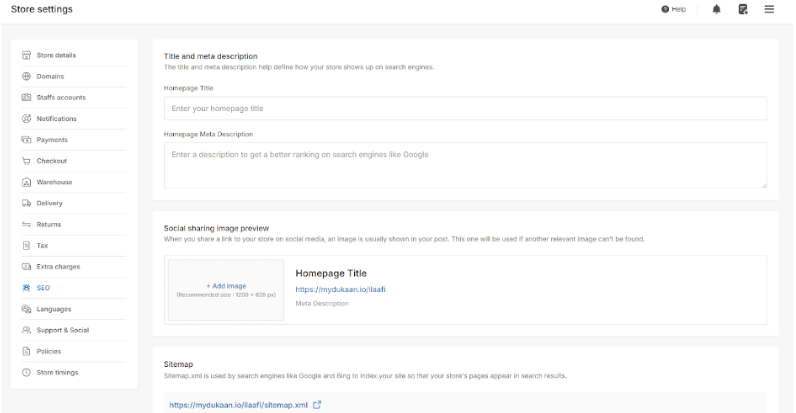
Shopify:
Shopify provides a more extensive set of marketing and SEO tools. These include built-in blog functionality, customizable meta tags, and advanced analytics.
Shopify also integrates with numerous marketing apps, allowing businesses to create sophisticated marketing campaigns and automate various aspects of their marketing efforts.
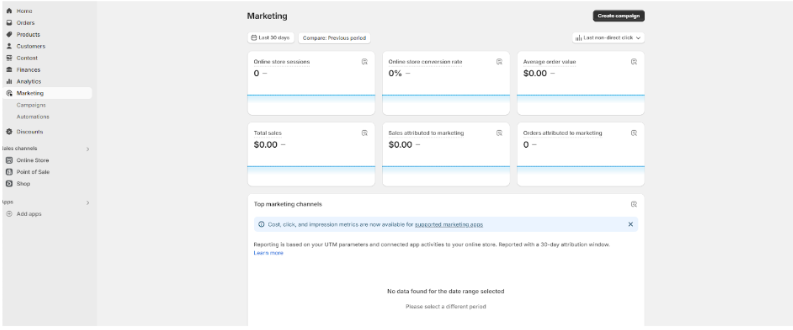
Verdict: With the help of Shopify, you can experiment with SEO better.
6. Customer Support
Dukaan:
Dukaan offers customer support primarily through email and chat. While their support team is responsive, the options are somewhat limited compared to Shopify.
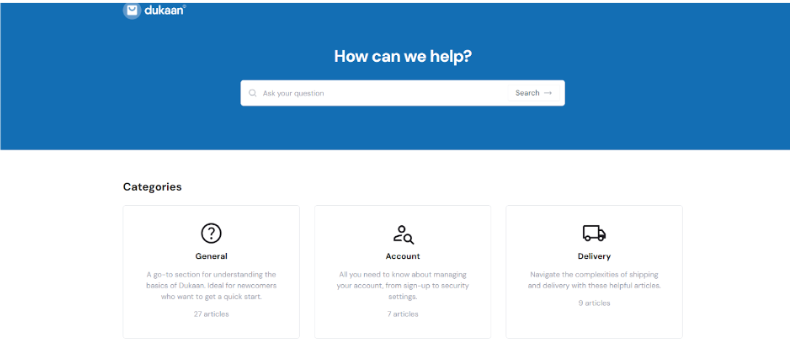
Shopify:
Shopify provides 24/7 customer support through various channels, including phone, email, and live chat. They also have an extensive knowledge base, community forums, and video tutorials, making it easier for users to find answers to their questions independently.
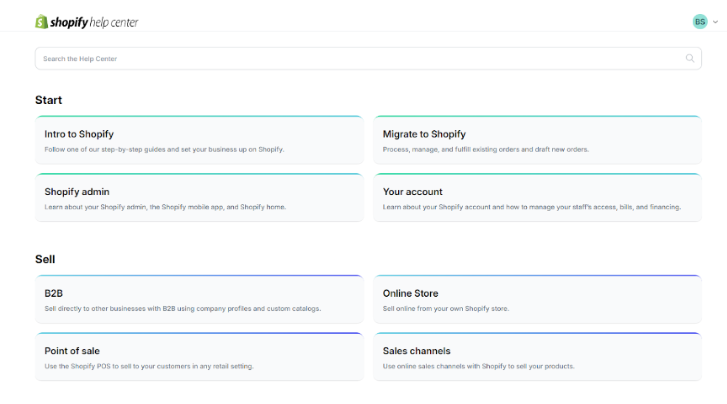
Verdict: Shopify has an excellent customer support team and services.
7. Mobile App Functionality
Dukaan:
Dukaan’s mobile app allows its users to manage their entire store from their smartphones. This includes adding products, processing orders, and even creating marketing materials.
Shopify:
Shopify also offers a mobile app that allows users to manage their store on the go. While not as central to the platform as Dukaan’s app, it provides essential functionality for managing orders, products, and customers from a mobile device.
Verdict: Running your store from your smartphone is easier with Dukaan.
8. Scalability
Dukaan:
Dukaan is designed to grow your business, offering features that can accommodate increasing sales and product catalogs. However, it may have limitations for very large enterprises or those with complex multinational operations.
Shopify:
Shopify is known for its scalability, with plans and features that can support businesses from startup to enterprise level. Its infrastructure can handle high-traffic volumes and large product catalogs, making it suitable for rapidly growing businesses.
Additionally, Shopify Plus and Shopify POS help Shopify users to scale their business online as well as offline.
Verdict: Dukaan is suitable for small businesses. However, once your business scales, Shopify would be a better option.
9. Security And Payment Processing
Dukaan:
Dukaan takes security seriously, offering SSL certificates for all stores and ensuring PCI DSS compliance for payment processing. However, the range of security features is somewhat limited compared to Shopify.
Shopify:
Shopify provides enterprise-grade security features, including SSL certificates, PCI DSS compliance, and fraud analysis tools. It also offers additional security apps through its app store, allowing businesses to enhance their store’s security as needed.
Verdict: As Shopify hosts large businesses and enterprises, it has better security and payment processing features.
Unique Dukaan Features
On the other hand, Dukaan also includes some unique features that are not included in Shopify. Here are more details about them:
- Mobile-first approach: Dukaan’s platform is built with mobile users in mind, making it exceptionally easy to manage a store from a smartphone.
- Quick setup: Dukaan claims that users can set up their online store in as little as 30 seconds, making it one of the fastest platforms to get started with.
- No transaction fees: Unlike many e-commerce platforms, Dukaan doesn’t charge any transaction fees, potentially saving businesses a significant amount as they grow.
- Integrated delivery services: Dukaan partners with various logistics providers in India, making it easy for businesses to manage shipping directly from the platform.
- WhatsApp integration: Dukaan allows businesses to easily share their product catalog on WhatsApp, tapping into the popular messaging app’s large user base in India.
- Multilingual support: Dukaan offers support for multiple Indian languages, making it accessible to a broader range of users across the country.
Unique Shopify Features
Shopify has some Unique features that are not included in Dukaan. Here are the details about those features:
- Shopify POS system: Shopify’s Point of Sale system integrates seamlessly with the online store, allowing businesses to manage both online and offline sales from a single platform.
- Shopify App Store: With thousands of apps available, businesses can extend their store’s functionality in numerous ways, from marketing and SEO to inventory management and customer service.
- Abandoned cart recovery: Shopify’s abandoned cart recovery feature automatically sends reminder emails to customers who have left items in their cart, helping to recover potentially lost sales.
- Multi-channel selling: Shopify integrates with various social media platforms and marketplaces like Instagram and TikTok, allowing businesses to sell their products across multiple channels from a single dashboard.
- Dropshipping capabilities: Shopify’s integration with dropshipping apps like Oberlo makes it easy for businesses to start a dropshipping business with minimal upfront investment.
- Advanced reporting and analytics: Shopify provides detailed reports on sales, customers, and inventory, helping businesses make data-driven decisions.
- Shopify Fulfillment Network: This service handles warehousing, packaging, and shipping for businesses, streamlining the order fulfillment process.
Dukaan Vs. Shopify: Pricing
This section will provide you insights about the pricing and plans of both platforms, helping you to decide which one you can opt for and find the one that fits your budget.
Dukaan Pricing
Dukaan has a free plan and three paid plans: Starter, Growth, and Infinity Plan. here are its pricing details:
| Plan | Monthly Plan | Annual Plan |
|---|---|---|
| Starter | $19/ month | $199/ month |
| Growth | $49/ month | $499/ month |
| Infinity | $199/ month | $1999/ month |

Next, let’s take a detailed look at the features of these plans.
- Free Plan
The free plan is more suitable when you want to learn and get comfortable with Dukaan and its functions.
Here are its features:
- 1 Online Store
- 1 Staff Account
- 7 Themes
- Dukaan Delivery
- Starter Plan
The Starter Plan is more suitable for small businesses and influencers. Some of its unique features are:
- 1 Online Store
- 2 Staff Accounts
- 2 Warehouses
- 7 Themes
- COD & Manual Payments
- Growth Plan
Growth Plan is suitable for scaling your business exponentially. Its standout features are:
- 3 Online Stores
- 5 Staff Accounts
- 5 Warehouses
- 14+ Themes
- Theme Editor
- Returns & Replacements
- Infinity Plan
This plan is suitable for sellers who wish to grow their business to a larger one. Its standout features are:
- 10 Online Stores
- 20 Staff Accounts
- 20 Warehouses
Shopify Pricing
Shopify Offers 4 plans to its users: Basic, Shopify, Advanced, and Plus.
Here is a table providing a basic idea of its pricing and card transaction rates:
| Categories | Basic Plan | Shopify | Advanced | Plus |
|---|---|---|---|---|
| Monthly Price | £25/month | £65/month | £344/month | $2,300 |
| Annual Price | £19/month | £49/month | £259/month | $2,300 |
| online | 2.9% + 30¢ | 2.7% + 30¢ | 2.5% + 30¢ | – |
| in person | 2.6% + 10¢ | 2.5% + 10¢ | 2.4% + 10¢ | – |
| 3rd-party payment providers | 2% | 1% | 0.6% | – |

Now, let’s take a detailed look at Shopify’s plans and its features.
- Basic Plan:
This plan is more popular among solo entrepreneurs.
The features included in the plan are:
- Up to 77% shipping discount10 inventory locations
- 24/7 chat support
- Localized global selling (3 markets)
- POS Lite
- Shopify Plan:
This plan is suitable for small teams and small businesses.
Here are its standout features:
- Up to 88% shipping discount and insurance
- 10 inventory locations
- 24/7 chat support
- Localized global selling (3 markets)
- 5 additional staff accounts
- POS Lite
- Advanced Plan:
This plan is more suitable for the businesses that are scaling. Here are its standout features:
- Up to 88% shipping discount, insurance, 3rd-party calculated rates
- Custom reports and analytics
- 10 inventory locations
- Enhanced 24/7 chat support
- Localized global selling (3 markets) + add markets for $59 USD/mo each
- 15 additional staff accounts
- 10x checkout capacity
- POS Lite
- Plus Plan:
Plus Plan is more suitable for complex businesses or enterprises. It includes the following standout features:
- Up to 88% shipping discount, insurance, 3rd-party calculated rates
- Custom reports and analytics
- 200 inventory locations
- Priority 24/7 phone support
- Localized global selling (50 markets)
- Unlimited staff accounts
- Fully customizable checkout with 40x capacity
- 200 POS Pro locations with Shopify Payments
- Sell wholesale/B2B
Dukaan Pros And Cons
Now, let’s take a closer look at Dukaan’s pros and cons. These pros and cons will help you evaluate the platform’s performance and will assist you in making an informed decision about whether Dukaan is the right fit for your business needs.
Dukaan Pros
- Extremely user-friendly and easy to set up
- Mobile-first approach ideal for on-the-go management
- No transaction fees
- Affordable pricing suitable for small businesses and startups
- Integrated delivery services tailored for the Indian market
- WhatsApp integration for easy catalog sharing
Dukaan Cons
- Limited customization options compared to Shopify
- Fewer integrations and apps are available
- Primarily focused on the Indian market, which may limit international expansion
- Basic SEO and marketing tools
- Limited scalability for very large enterprises
Shopify Pros And Cons
Next, let’s take a detailed look at Shopify’s pros and cons.
Shopify Pros
- Extensive feature set suitable for businesses of all sizes
- Large ecosystem of apps and integrations
- Excellent security features
- Significant customer support
- Scalable from small businesses to large enterprises
- Multi-channel selling capabilities
- Advanced reporting and analytics
Shopify Cons
- Higher monthly fees compared to Dukaan
- Transaction fees for using external payment gateways
- Steeper learning curve due to more complex features
- Some advanced features are only available on higher-tier plans
- Customization may require coding knowledge for extensive changes
Dukaan Vs Shopify – Which Platform Is Right For You?
- For Small Businesses in India:
Dukaan offers attractive features for small businesses and startups, especially those in India. Its easy setup, affordable pricing, and mobile-first approach make it ideal for entrepreneurs who want to quickly establish an online presence without a significant learning curve or financial investment. Dukaan’s no-transaction-fee policy can also be a significant advantage for businesses operating on tight margins.
- For small businesses anticipating expansion:
If you have a small business and anticipate rapid growth or have plans for international expansion, Shopify might be the better long-term choice. While it comes with a higher price tag and slightly steeper learning curve, Shopify’s scalability and extensive feature set can accommodate a business’s growing needs without requiring a platform switch later on.
- For medium to large businesses:
Shopify generally offers a more comprehensive solution for medium to large enterprises. Its advanced features, extensive app ecosystem, and scalability make it suitable for businesses with complex needs or those operating across multiple markets.
Meanwhile, some medium-sized businesses, particularly those primarily serving the Indian market, might find Dukaan sufficient for their needs. Its simplicity and cost-effectiveness could be advantageous, especially if the business doesn’t require the full range of features offered by Shopify.
Related Reads:
Conclusion: Shopify Is Quite Ahead Of Dukaan With Its Features!
Both Dukaan and Shopify offer valuable e-commerce solutions, each with its own strengths and potential drawbacks.
Dukaan shines in its simplicity, affordability, and mobile-first approach, making it an excellent choice for small businesses and startups, particularly those in India. Its quick setup process and lack of transaction fees can be significant advantages for entrepreneurs looking to establish an online presence quickly and cost-effectively.
Shopify, on the other hand, offers a more comprehensive and scalable solution suitable for businesses of all sizes. Its extensive feature set, large app ecosystem, and robust scalability make it a versatile choice that can grow with your business.
While it comes with a higher price tag and potentially steeper learning curve, the investment can pay off in terms of functionality and growth potential.
Ultimately, your choice between Dukaan and Shopify will depend on your specific business needs, growth plans, and target market. However, I found Shopify to be far ahead of Dukaan due to its extensive features.
FAQs
Dukaan and Shopify are different e-commerce platforms. While both allow you to create online stores, they have different features, pricing structures, and target markets. Dukaan is primarily focused on the Indian market with a mobile-first approach, while Shopify is a global platform with a more comprehensive feature set.
Shopify faces competition from several e-commerce platforms, including WooCommerce, BigCommerce, and Magento.
While Dukaan is primarily focused on the Indian market and offers features tailored to Indian businesses, it’s not exclusively for Indian businesses. However, its localized features and partnerships with Indian service providers make it particularly attractive for businesses operating in India.
It’s possible to migrate from Dukaan to Shopify or vice versa, but the process can be complex and may require some manual work. Both platforms offer tools and guides for importing products, but you may need to recreate your store design and reconfigure certain settings.
Both Dukaan and Shopify support the sale of digital products. Shopify has built-in features for selling digital goods, including automatic delivery of digital files after purchase. Dukaan also allows the sale of digital products, though the process might be slightly less streamlined compared to Shopify.

